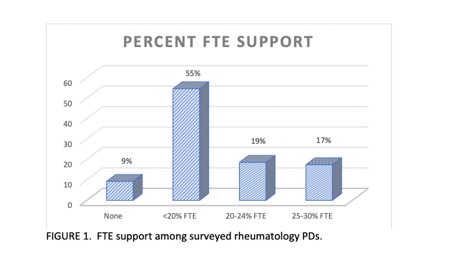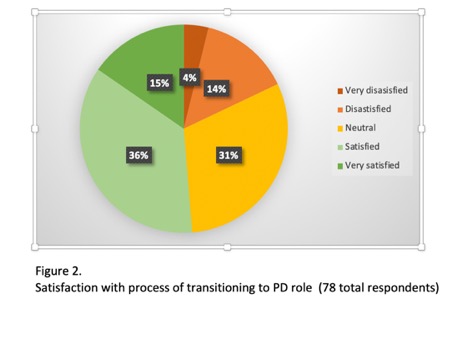Session Information
Session Type: Abstract Session
Session Time: 2:45PM-3:00PM
Background/Purpose: Clinical educators taking on the new role as program director (PD) must have the time and resources to learn about all the processes (e.g., accreditation, assessment) that are essential to the effective management of a fellowship training program. Lack of preparation can lead to inadequate performance and dissatisfaction with the role. We conducted a needs assessment of current and former rheumatology PDs to determine the type of support needed to become an effective rheumatology PD. The survey asked variables that might affect their transition to a leadership role (such as previous experience, fiscal and mentor support), the enthusiasm for rheumatology-specific PD mentorship, overall satisfaction with the transition, and specific resources that would have eased the transition.
Methods: An electronic survey was emailed to 186 current and former rheumatology program directors currently on the American College of Rheumatology’s Committee on Training and Workforce listserv. Survey question types included single response, multi-select and free response.
Results: Ninety (48.4%) current or former rheumatology PDs responded to the survey. Of the 90 responses, 86 (46.2%) were completed beyond the demographics questions. Respondents to the survey were evenly split between newer and more experienced PDs; 50% of respondents had been a rheumatology PD for 5 years or less in the rheumatology PD role whereas 50% of respondents had been in this role for more than 5 years. Full-time equivalent (FTE) support for PDs varied considerably, with the majority of PDs (64%) receiving less than 20% FTE for their role as program director. Eight (9 %) respondents did not receive any support for their role as PD. Of those who completed a question on their satisfaction with the transition process, only 12 (15.7%) respondents were very satisfied with their transition to becoming a PD whereas 49% (38 out of 78) where neutral, dissatisfied or very dissatisfied with the transition (Fig. 1). There was overwhelming support (88%) for a transition mentorship program for new PDs. Program directors were most interested in a curriculum that included a practical discussion of how to run a program (86.9%), developing core curriculum (46.5%) and assessment of fellows (46.5%).
Conclusion: Based on our survey of PDs, we identified several areas suitable for innovation. A mentor program for new PDs was desired by most, indicating the need for additional support and training during the PD transition period. Furthermore, FTE support was found to be less than that outlined in the Accreditation Council for Graduate Medical Education (ACGME) common program requirements (at least 20%) for the majority of the rheumatology PDs. These results should inform key stakeholders on the need for more support for PDs to include mentorship, educational content and fiscal support.
To cite this abstract in AMA style:
Wolfe R, Koumpouras F, Dua A, Seo P, Helfgott S, Jonas B. A Needs Assessment for the Transition into a Rheumatology Program Director Role: Survey of Current and Former Rheumatology Program Directors [abstract]. Arthritis Rheumatol. 2021; 73 (suppl 9). https://acrabstracts.org/abstract/a-needs-assessment-for-the-transition-into-a-rheumatology-program-director-role-survey-of-current-and-former-rheumatology-program-directors/. Accessed .« Back to ACR Convergence 2021
ACR Meeting Abstracts - https://acrabstracts.org/abstract/a-needs-assessment-for-the-transition-into-a-rheumatology-program-director-role-survey-of-current-and-former-rheumatology-program-directors/


